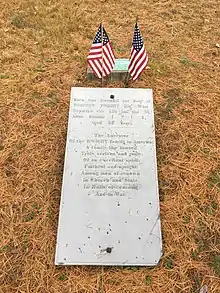Timothy Dwight (Massachusetts politician)
Captain Timothy Dwight (1629–1718) represented Dedham in the Great and General Court[1] of Massachusetts and was the progenitor of the Dwight family.[2]

Personal life
Dwight was born in England in 1629 to John and Hannah Dwight[1] and was brought to Dedham, Massachusetts in 1635 as a child.[3][1] John Dwight was one of the first settlers of Dedham.[4] Timothy was made a freeman in 1655 and was a member of the First Church and Parish in Dedham beginning in 1652.[1]
Dwight was married six times. The first time was on November 11, 1651, to Sarah Perman, who died in childbirth on May 29, 1652.[5][6] On May 3, 1653, he married Sarah Powell, who died on June 27, 1664; she gave him four children.[5][6][lower-alpha 1] Anna Flynt, his third wife on January 9, 1664 – 1665, gave him 10 children, including Josiah Dwight.[7][5][lower-alpha 2]
His fourth wife, the widow Mary Endwind of Reading, Massachusetts, married him on January 7, 1686 – 1687 and died August 30, 1688, without any children.[8] Esther Fisher became his fifth wife on July 31, 1690, and died on January 30, 1690 – 1691.[lower-alpha 3] Bethia Morse, his final wife, married him on February 1, 1691 – 1692 and died on February 6, 1717 – 1718.[6] He had 14 children.[3]
Military and public service
Dwight served in the Great and General Court from 1691 to 1692 and perhaps later.[1] He also served for 10 years as Town Clerk and 25 years as selectman.[1] His public service was praised by Rev. Samuel Dexter, who called him "a man of renown."[1]
Dwight, with Richard Ellis, served as the agent of the Town when negotiating with King Phillip for title to the land today known as Wrentham, Massachusetts in 1660.[9] He was also town clerk for a total of 10 years, having first been elected in 1661.[10][11] He served 24 terms as selectman, beginning in 1644.[12]
He was a cornet of a cavalry troop as a young man and later served as a captain of foot soldiers.[1] He fought against the native peoples in the area ten times, and either killed or took prisoner nine.[1]
Death
Dwight built the first tomb in the Old Village Cemetery around 1700.[13][9] In that tomb are laid his body, Eleazer Lusher, William Adams.[2] He died on January 31, 1718, and was buried on February 7, 1718, the same day as his wife,[2][1][8] Bethia, who died the day before.[6] His pallbearers included Governor Joseph Dudley and Judge Samuel Sewall.[2]
Notes
- Sarah was the daughter of Michael Powell[4][5]
- Flynt was born September 11, 1642. Her maternal uncle was Leonard Hoar, President of Harvard College.[5]
- Esther was the daughter of Daniel Fisher[4]
References
- Dwight 1874, p. 102.
- Smith 1936, p. 147.
- Goodwin 1982, p. 41.
- Goodwin 1982, p. 40.
- Dwight 1874, p. 104.
- Goodwin 1982, pp. 40–41.
- Sewall, Samuel (1882). Diary of Samuel Sewall: 1674-1729. Massachusetts Historical Society. p. 194. Retrieved June 12, 2021.
- Dwight 1874, p. 105.
- Dwight 1874, p. 103.
- Worthington 1827, p. 79.
- Hanson 1976, p. 70.
- Worthington 1827, p. 79-81.
- Smith 1936, p. 146.
Works cited
- Smith, Frank (1936). A History of Dedham, Massachusetts. Transcript Press, Incorporated. Retrieved July 18, 2019.
- Goodwin, Nathaniel (1982). Genealogical Notes Or Contributions to the Family History of Some of the First Settlers of Connecticut and Massachusetts. Genealogical Publishing Com. ISBN 978-0-8063-0159-4. Retrieved 31 August 2019.
- Dwight, Benjamin Woodbridge (1874). The History of the Descendants of John Dwight, of Dedham, Mass. J. F. Trow & son, printers and bookbinders. Retrieved September 9, 2019.
- Worthington, Erastus (1827). The history of Dedham: from the beginning of its settlement, in September 1635, to May 1827. Dutton and Wentworth. Retrieved November 8, 2019.
- Hanson, Robert Brand (1976). Dedham, Massachusetts, 1635-1890. Dedham Historical Society.